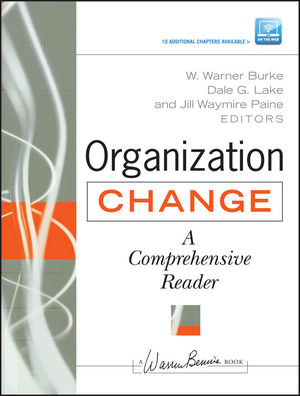Organization Change: A Comprehensive ReaderISBN: 978-0-470-26056-2
Paperback
1016 pages
December 2008, Jossey-Bass
 This is a Print-on-Demand title. It will be printed specifically to fill your order. Please allow an additional 10-15 days delivery time. The book is not returnable.
|
||||||
Foreword xiii
Preface xv
PART ONE ENVIRONMENT AS STIMULUS FOR CHANGE 1
Editors’ Interlude
1 The Causal Texture of Organizational Environments 7
F. E. Emery • E. L. Trist (1965)
2 Changing Organizations 21
W. G. Bennis (1966)
3 Survival and Performance in the Era of Discontinuity 35
R. N. Foster • S. Kaplan (2001)
4 Management and the Scientific Renaissance 51
R. Pascale • M. Millemann • L. Gioja (2000)
PART TWO THEORIES AND MODELS OF PLANNED ORGANIZATION CHANGE 65
Editors’ Interlude
5 Quasi-Stationary Social Equilibria and the Problem of Permanent Change 73
K. Lewin (1947)
6 The Mechanisms of Change 78
E. H. Schein (1964)
7 General Strategies for Effecting Changes in Human Systems 89
R. Chin • K. D. Benne (1967)
8 Toward a Theory of Motive Acquisition website (see p. xii)
D. C. McClelland (1965)
9 Nature Intervenes: Organizations as Organisms website (see p. xii)
G. Morgan (1997)
10 Sociotechnical Systems: Origin of the Concept 118
E. Trist (1981)
11 Evolution and Revolution as Organizations Grow website (see p. xii)
L. E. Greiner (1998)
12 Revolutionary Change Theories: A Multilevel Exploration of the Punctuated Equilibrium Paradigm 144
C.J.G. Gersick (1991)
13 Organizational Evolution: A Metamorphosis Model of Convergence and Reorientation 174
M. L. Tushman • E. Romanelli (1985)
14 Organizational Change and Development website (see p. xii)
K. E. Weick • R. E. Quinn (1999)
15 Kurt Lewin and the Planned Approach to Change: A Reappraisal 226
B. Burnes (2004)
PART THREE DIAGNOSING THE CURRENT STATE 255
Editors’ Interlude
16 Understanding Organizations: The Process of Diagnosis 259
W. W. Burke (1992)
17 A Causal Model of Organizational Performance and Change 273
W. W. Burke • G. H. Litwin (1992)
18 An Overview of Organizational Surveys 300
A. I. Kraut (1996)
19 Toward Integrated Organizational Diagnosis 312
A. Howard • Associates (1994)
PART FOUR UNDERSTANDING RESISTANCE 331
Editors’ Interlude
The Nature of Resistance
20 Overcoming Resistance to Change 341
L. Coch • J.R.P. French, Jr. (1965)
21 Resistance to Change 364
G. Watson (1967)
22 A Theory of Psychological Reactance 377
J. W. Brehm (1966)
23 Change Resisted: Thirty-Three Hypotheses Why website (see p. xii)
J. O’Toole (1995)
Individual Response to Change
24 Managing Organizational Transitions 393
W. Bridges (1986)
25 The Recipients of Change 404
T. D. Jick (1990)
26 Rethinking Resistance and Recognizing Ambivalence: A Multidimensional View of Attitudes Toward an Organizational Change 418
S. K. Piderit (2000)
Group Response to Change
27 A Theory of Group Development 441
W. G. Bennis • H. A. Shepard (1956)
28 The Work of Wilfred Bion on Groups 466
M. J. Rioch (1970)
Organization Response to Change
29 Organizational Identity and Learning: A Psychodynamic Perspective 481
A. D. Brown • K. Starkey (2000)
30 The Quest for Resilience 512
G. Hamel • L. Vailikangas (2003)
PART FIVE ORGANIZATION CHANGE INTERVENTIONS 533
Editors’ Interlude
31 Strategies of Consultation 539
R. R. Blake • J. S. Mouton (1972)
Individual-Level Change Interventions
32 Creating Readiness for Organizational Change 569
A. A. Armenakis, S. G. Harris • K. W. Mossholder (1993)
33 Selecting Personnel for a System 4 Organization website (see p. xii)
D. King (1972)
34 Training and Development 590
W. W. Burke (1982)
35 Coaching Leaders in Transition: Lessons from the Field 599
R. Witherspoon • M. D. Cannon (2004)
Group-Level Change Interventions
36 Team Building 629
W. W. Burke (1982)
37 What Is Process Consultation? 642
E. Schein (1999)
38 Dilemmas of Managing Participation website (see p. xii)
R. M. Kanter (1983)
39 Understanding and Using Large System Interventions 667
B. B. Bunker • B. T. Alban (2002)
Organization-Level Interventions
40 The Change Process: Why Change? 687
R. Beckhard • R. T. Harris (1987)
41 Creating a Climate and Culture for Sustainable Organizational Change website (see p. xii)
B. Schneider, A. P. Brief • R. A. Guzzo (1996)
42 Interorganizational Relations 699
W. W. Burke • N. W. Biggart (1997)
PART SIX KEY ROLES IN PLANNED ORGANIZATION CHANGE 733
Editors’ Interlude
43 ‘‘All We Like Sheep—’’ (Isaiah 53:6): Followers and Leaders website (see p. xii)
M. J. Rioch (1971)
44 Leading Organization Change 737
W. W. Burke (2008)
45 The Psychology of Self-Management in Organizations 762
J. R. Hackman (1986)
46 The Discipline of Teams website (see p. xii)
J. R. Katzenbach • D. K. Smith (1993)
PART SEVEN BUILDING KNOWLEDGE OF CHANGE THROUGH ASSESSMENT 809
Editors’ Interlude
47 Short- and Long-Range Effects of a Team Development
R. Beckhard • D. G. Lake (1971) Effort 813
48 Measuring Change and Persistence in Human Affairs: Types of Change Generated by OD Designs 834
R. T. Golembiewski. • K. Billingsley • S. Yeager (1976)
49 Explaining Development and Change in Organizations 859
A. H. Van de Ven • M. S. Poole (1995)
50 Organization Change and Development 893
M. Beer • A. E. Walton (1987)
51 A Complex-Systems Approach to Organizations 924
D. J. Svyantek • L. L. Brown (2000)
52 The Evolving Field of Organizational Learning 935
C. Argyris • D. A. Schӧn (1996)
PART EIGHT SOME CONCLUSIONS AND FUTURE NEEDS 955
Editors’ Interlude
Names Index 959
Subject Index 976
Credits 991



